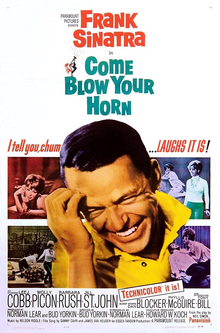| Come Blow Your Horn | |
|---|---|
 Theatrical release poster | |
| Directed by | Bud Yorkin |
| Screenplay by | Norman Lear |
| Based on | Come Blow Your Horn by Neil Simon |
| Produced by |
|
| Starring | |
| Cinematography | William H. Daniels |
| Edited by | Frank P. Keller |
| Music by | Nelson Riddle |
Production companies |
|
| Distributed by | Paramount Pictures |
Release date |
|
Running time | 112 minutes |
| Country | United States |
| Language | English |
| Box office | $12.7 million [1] |
Come Blow Your Horn is a 1963 American comedy film directed by Bud Yorkin from a screenplay by Norman Lear, based on the 1961 play of the same name by Neil Simon. The film stars Frank Sinatra, Lee J. Cobb, Molly Picon, Barbara Rush, and Jill St. John.